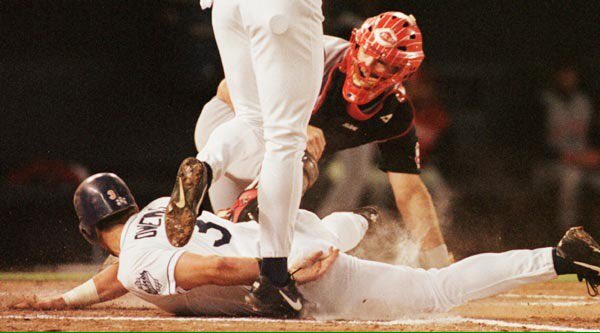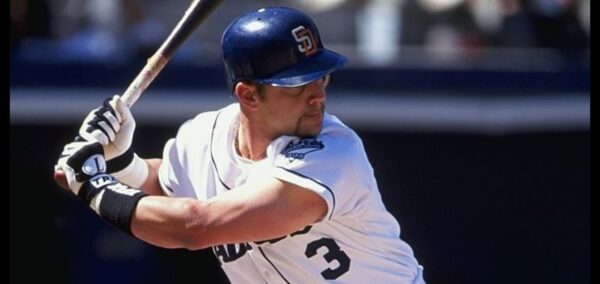Q & A with former Padres’ outfielder Eric Owens

Credit: AP Photo
Eric Owens is a legend among the San Diego Padres’ fan base. Here is a little bit more about the man.
Heart and hustle do not take days off on the baseball field. Eric Owens gave it all he had for the San Diego Padres in his two seasons with the franchise.
Last week, I wrote about how Owens moved mountains in his time with the Padres. In gathering information from the former Padres’ outfielder, there was so much content that a second piece was needed. Here is that article, in a question-and-answer format. Enjoy.
What was it like to have Trevor Hoffman as a teammate? Tell me a little bit about his routine.
“Unbelievable. I was in the minor leagues in Cincinnati when he was making the transition to a pitcher. I got to know Trevor a little bit during instructional league. To be a teammate of him and see him on a daily basis was amazing. It was not for show. He had a work ethic like no human being I have ever seen before in my life. I remember going up the locker room in the 4th or 5th inning to use the bathroom, and Trevor would be in there eating a steak and baked potatoes with a salad. He would be eating hamburgers and hotdogs, but when his number was called, he was there. He had a routine, and he stuck to it. What a great guy he is too.”
What do you remember most about Trevor Time?
“I loved playing left field when he would come into a ball game in the ninth. I got to bypass him as he was going out to the mound. Hearing the music, watching him trot out there. Seeing a future Hall-of-Famer go out there, and you knew the game was locked up. I had goosebumps every time I passed him. If a ball was hit out to me- I was going to catch it. I was not going to let this guy down.”
What was it like to have Bruce Bochy as your manager?
“I had an opportunity to play for many great managers, but I consider him the best. He was the best. It is a game, and their job is on the line. They really have no control over what is going on. He would talk to you the same whether you were 0-f0r-4 or 4-for-4. He never changed. He never wavered. He was a player’s coach. He would sit on the plane and see how you are doing. He did the extra stuff which it took to be a player’s manager, but he also wanted to win. He was almost like a father figure. If he raised his voice, and he is a big man, you were like- Woah. But you very rarely heard that. He wanted you to succeed. What he did best was put you in situations where you could succeed. As a player, the only thing you had to do was go out there and do it.”
You played multiple positions. Did you enjoy that, or was that just a way for you to get yourself in the lineup?
“Everybody wants to play one position because it is a little bit easier. It was a great joy because I knew I was going to be in the lineup every day and play. I learned different positions, and when I got into coaching- it gave me a lot of insight. I played every position except for pitcher and catcher. It was very beneficial for me to move around, and it prolonged my career too.”
How hard was it to have to go to a new team (the Marlins) and try to prove yourself?
“(With a sigh)… the most difficult thing was trying to prove myself. It took me a while to get that mojo back. With very few fans at the games, it was a totally different atmosphere than I was used to in San Diego. Even though it is a business, we are human. I made lasting friendships from my days with the Marlins.”
Any thoughts on the current San Diego Padres?
“It is exciting to see them going out and getting the players and having the resources to put together a championship-caliber team. What a beautiful community and, my God, to be able to play in San Diego. Players love it. It should be a very exciting year for them.”
What are your thoughts on Fernando Tatis Jr.
“What a phenomenal talent he is. He is only going to get better. He is a cornerstone guy. A guy you build the team around.”
What do you like most about Fernando Tatis Jr.
“You look at guys like Mike Trout and Tatis, and they may have a little more show in them, but they play hard. When you play hard, people respect you. You can’t control how many hits you get, but you can control your effort level.”
Qualcomm Stadium is now gone. What do you remember most about it?
“The biggest thing is that I stayed at some condos at the top of the hill, and you could see down into the stadium. It was a beautiful stadium. When we played the Dodgers and Giants, the place was crazy. It was amazing to be a part of that.”
Do you have any thoughts on Petco Park?
“What a beautiful place. The setting and all. If you can’t play there, you will have a hard time playing anywhere.”
When was the last time you were at Petco Park?
“I went to Petco Park somewhere around 2009 or 2010 for a fan appreciation thing. They called me and asked me to come out for a few days. Buddy Black was the pitching coach for the Angels when I played in Anaheim, so I had a connection.”
What veterans besides Gwynn took you under their wing when you first came to San Diego?
“Dave Magadan and Wally Joyner were two of the guys I leaned on a lot. They had been through the wars. I remember talking to Magadan about pinch-hitting a lot. Because that was what he was doing at the time in his career, and he was really good at it. Me and Wally had the same agent (Barry Axelrod), so we kind of knew each other. We played golf together often and talked.”
Where did the players hang out and bond when in San Diego? Was there a particular place?
“The majority of the time, we hung out in the clubhouse. Nowadays, you probably don’t see that as much. An hour and hour and a half after the game, we would hang out and eat dinner there and talk about baseball, life, you know? It was a comradery-type thing inside the clubhouse.”
[wpedon id=”49075″ align=”right”]
What are you currently up to?
“I run a mentorship program here in Whitby, Ontario. I take 15-20 kids that have the talent and want to pursue baseball in the States for college. We do two or three lessons per kid each month. I will go out and watch them play. 10-15 times a year, I will go see them. Then we will sit down and talk about the mental side of the game. I try to get into them mentally as well as physically. I also run some baseball camps in the area during the summer months. We have 4 or 5 kids over in the States playing now.”
Would you want to get back into professional baseball as a coach?
“I wouldn’t mind getting back into the professional game. I was spent with the travel. I would never close the door, but I understand that once you are out of the game for a little bit, it is hard to get back in. I love what I do with these kids. I feel like I am making a difference here in Whitley. The biggest thing for me is to make a difference in these kid’s careers and in their lives. Baseball is like everyday life, and sometimes you need thick skin to make it through the day.”
Any thoughts for the fans in San Diego who still dearly love you?
“Thank you so much for taking me in, back in those days. Thank you for appreciating the way that I played. It is the biggest compliment that you can get for people to respect and enjoy the way you played the game. I went out and played for the San Diego community and felt every fan was behind me. You can move mountains with that many people behind you.”
Please visit EObaseball.com for more information about Eric Owens.
James was born and raised in America’s Finest City. He is a passionate baseball fan with even more passion towards his hometown Padres. Editor-In-Chief of EastVillageTimes.com. Always striving to bring you the highest quality in San Diego Sports News. Original content, with original ideas, that’s our motto. Enjoy.
